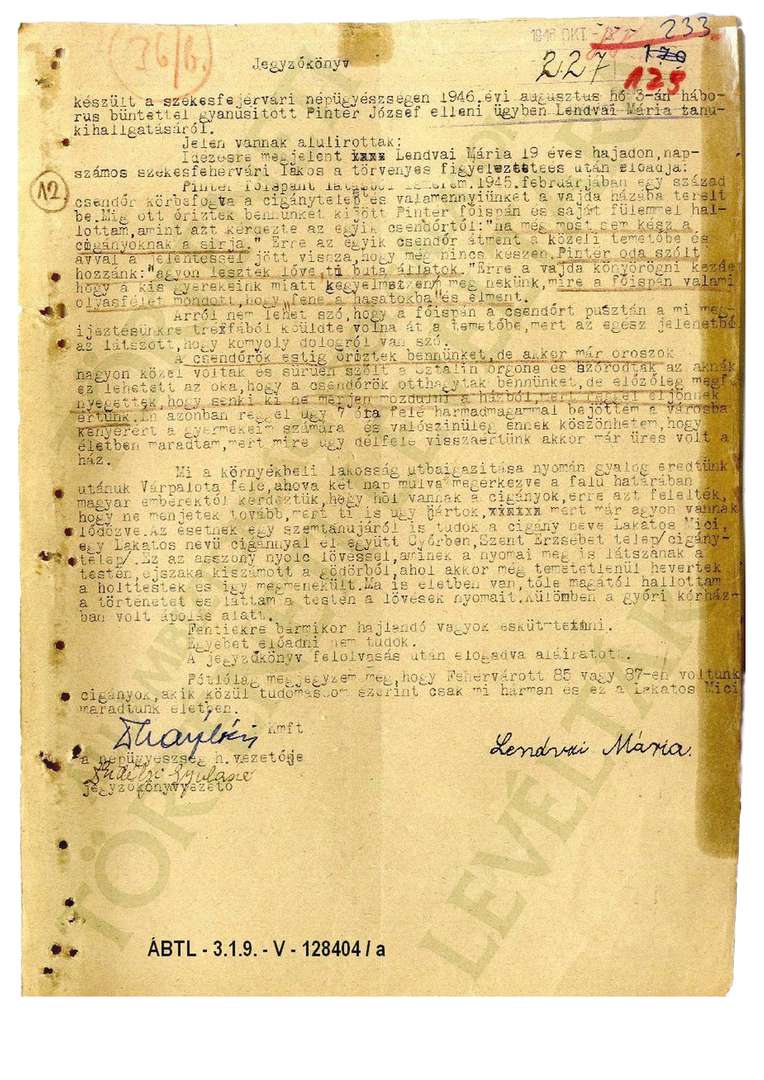Lendvai Mária (túélö) tanúvallomása a székesfehérvári cigányok összegyüjtéséröl és Várpalotára szállításárol.
Székesfehérvár, 1946 augusztus 3.
Székesfehérvári Népügyészség, 1946. augusztus 3.
Népbiróság Székesfehérvár 227/1946 (1946 október 3.)
Jegyzökönyv
Készülz a székesfehérvári népügyészségen 1946. évi augusztus hó 3-án háborus büntettel gyanusitott Pintér József elleni ügyben Lendvai Mária tanúkihallgatásáról. Jelen vannak alulírottak:
Idézésre megjelent Lendvai Mária 19 éves hajadon, napszámos, székesfehérvári lakos a törvényes figyelmesztetés után elmondja:
Pintér föispánt látásból ismerem. 1945 februárjában egy század csendör körbefogta a cigánytelepet, és valamennyiünket a vajda házába terelt be. Míg ott öriztek bennünket, kijött Pintér föispán és saját fülemmel hallottam, amint azt kérdezte az egyik csendörtöl: »na még most sem kész a cigányoknak a sírja?« Erre az egyik csendör átment a közeli temetöbe, és avval a jelentéssel jött vissza, hogy még nincs készen. Pintér oda szolt hozzánk: »agyon lesztek löve, ti buta állatok«. Erre a vajda könyörögni kezdett, hogy a kis gyermekeink miatt kegyelmezzen meg nekünk, mire a föispán valami olyasfélét mondott, hogy »fene a hasatokba«, es elment.
Arról nem lehet szó, hogy a föispán a csendört pusztán a mi megíjesztésünkre, tréfából küldte volna át a temetöbe, mert az egész jelenetböl az látszott, hogy komoly dologról van szó.
A csendörök estig öriztek bennünket, de akkor már oroszok nagyon közel voltak, és sürüen szolt a Sztálin-orgona, és szorodtak az aknák, ez lehetett az oka, hogy acsendörök ott hagytak bennünket, de elözöleg megfenyegettek, hogy senki ki ne merjen mozdulni a házbol, mert reggel eljönnek értünk. Én azonban reggel úgy 7 óro felé harmadmagammal bejöttem a városba kenyérért a gyermekeim számára, és valoszinüleg ennek köszönhetem, hogy életben maradtam, mert mire úgy délfelé visszaértünk, akkor már üres volt a ház.
Mi akörnyékbeli lakosság útbaigazitása nyomán gyalog eredtünk utánuk Várpalota felé, ahova két nap múlva megérkezve a falu határában magyar emberektöl kérdeztük, hogy hol vannak a cigányok? Erre azt feleltek, hogy ne menjetek tovább, mert ti is úgy jártok, mert már agyon vannak lödözve. Az esetnek egy szemtanújárol is tudok, a cigány neve Lakatos Mici, egy Lakatos nevü cigányal él együtt Györben, Szent Erzsébet telep /cigánytelep/. Ez az asszony nyolc lövéssel, aminek a nyomai meg is látszanak a testén, éjszaka kimászott a gödörböl, ahol akkor még temetetlenül hevertek a holttestek, és igy megmenekült. Ma is életben van, töle magátol hallottam a történetet, és láttam a testén a lövések nyomait. Különben a györi kórházban volt ápolás alatt.
Fentiekre bármikor is hajlandó vagyok esküt tenni.
Egyebet elöadni nem tudok.
A jegyzökönyv felolvasása után elfogadva aláíratott.
Pótlag megjegyzem még, hogy Fehérvárott 85 vagy 87-en voltunk cigányok, akik közül tudomásom szerint csak mi hárman és a Lakatos Mici maradtunk életben.
Dr. László Ervin
a népügyészség h. vezetöje
Dr. Erdélyi Gyuláné
Jegyzökönyvvezetö
Lendvai Mária







